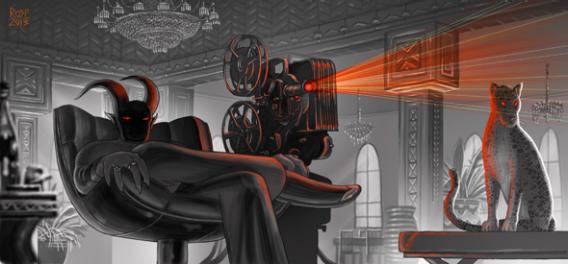Be advised: In order to derive the maximum level of pleasure from reading Marisha Pessl’s new detective-occult-noir-mystery extravaganza Night Film, you will be required to make a pact with the devil. The devil will appear in a cloud of ambiguously-scented vapor—sulfurous, yes, but with an unexpectedly pleasant citrus note—and with one plump and soft hand, nails buffed to a dazzling sheen, he will extend toward you some desirable readerly consumables: an intriguing setup, a propulsive plot, a mysterious villain, and a selection of entertaining set pieces. But his other hand will be a gnarled, twisted claw, and its yellowed talons will clutch a quill and parchment with which you will be obliged to sign over to him certain fundamental literary priorities: narrative credibility and psychological realism, for instance, and the adherence to basic standards of best practice in literary prose.
About a quarter of the way into this novel’s damn near 600 pages, I decided that if I wanted to keep enjoying it as much as I was, which was quite a lot, it was going to be necessary to make such a compromise; and so I glanced over at the little James Wood-shaped angel on my right shoulder, told him to sit this one out, and put quill to parchment. It paid off for a while, and then it sort of didn’t, as is often the way with your standard infernal pacts.
The novel is smoothly propulsive in its opening pages. There’s a short, creepily cinematic prologue in which our narrator, professionally disgraced journalist Scott McGrath, jogs through Central Park late at night and has the bejesus scared out of him by a bedraggled figure in a red coat who keeps appearing in the distance and moving in an unnatural fashion. Pessl then makes the risky but effective gambit of sending us straight into a series of Web pages reporting on the death of Ashley Cordova, the beautiful and talented daughter of reclusive horror film auteur Stanislas Cordova. We’re informed, via the New York Times website, of a police investigation into reports that she committed suicide by jumping down a disused elevator shaft. We then get an entire 18-page Time.com slideshow on the enigma of her father’s strange and disturbing films—surely the inaugural deployment of traffic-driving click-through tactics in narrative fiction. It’s a gimmick, but it works. Pessl is all business right from the start, and the business she’s in is the turning of pages. (I’m going to be very careful here, rest assured, because Night Film is the type of book that, once you start talking about it at all, you stray into spoiler territory pretty easily if you don’t watch where you’re going.)
McGrath has a personal interest in the case for reasons that are intimately linked to his aforementioned professional disgrace. He had been researching a biography of Cordova when an anonymous caller offered a vague tipoff about the director’s involvement in some horrible, undefined crime: “There’s something he does to the children,” the caller says, then hangs up. In an interview on Nightline, McGrath heedlessly blurts out (to Martin Bashir, one of the great blurt-extractors of our IRL time) that Cordova is a predator who needs to be “terminated with extreme prejudice.” He thereby brings down upon his head a ruinous $250,000 slander settlement, destroying both his personal finances and his journalistic reputation.
But when he hears about Ashley’s death, McGrath is convinced that there is more to it than the official record reveals, and he becomes obsessed once more with uncovering details about the life of the legendary director. Cordova, the book’s absent center, is an intriguing character, a neo-Gothic mashup of de Sade, J.D. Salinger, David Lynch and Count Dracula. He is largely invisible, but his is a detailed, highly realized form of absence; we glimpse him mostly through descriptions of his work, and through second- and third-hand accounts of meetings. He’s a cult outlaw genius-type figure who began his career making relatively mainstream horror films in the early ’60s, but whose artistic vision gradually became so extreme and uncompromising that the studios stopped backing his work, forcing him to finance and release it himself. His post-Hollywood output, collectively known as the “black tapes,” has a formidable reputation; the films are almost impossible to find anywhere—banned for reasons that, in a cultural moment when “torture porn” is an established film genre, are never quite made clear. Much of what we learn about him is revealed in a handful of interpolated sections, cordoned off from the main first-person narrative, which provide us with a dossier of miscellaneous cuttings—interviews, magazine articles, and screenshots from an Internet forum known as the Blackboards, a clandestine gathering point for Cordova’s underground army of fans.
In McGrath’s quest to find out what really happened to Ashley, Pessl contrives to hook him up with a pair of young sidekicks—Hopper, a plucky and raggedly handsome drug dealer of Ashley’s acquaintance, and Nora, an even pluckier young coat-check girl/actor who was the last person to see Ashley alive. Early in the book, we hear tell of strange doings up at the old Cordova place, up to and including tales of actual devilry. (True to Gothic villain form, Cordova sequesters himself away in a vast and high-walled rural estate out in upstate New York, which he seems never to leave and where the back half of his filmography was all shot and edited.) A hell of a lot of stuff gets thrown at the reader very quickly: There’s an underground hard-core S&M nightclub, an insane asylum, a villainous priest; there are black magic curses, haunted dolls, and even some actual cliff-dangling. The plot is relentlessly, hurtlingly linear and, for much of the book’s excessive length, manages to be no less enjoyable for all its frequent flirtations with preposterousness. (Here, in the casual overlooking of things that a critic frankly has no business overlooking, is where the above-outlined pact with the devil paid off.)
McGrath comes with many of the standard fixtures and fittings of the noir narrator (stoic wit, stubborn determination, questionable instincts of self-preservation, long-suffering ex-wife, taste for the sauce, etc.). He’s a writer of some apparent substance—investigative journalism awards, numerous books, high-impact stories for Esquire and Time—but the rock-hard edifice of his prose has quite a few structural issues. There are whole pages that look as though they were copy edited by a tag team of Thomas Bernhard and Edgar Allan Poe, indiscriminately italicizing anything not nailed to the floor. The writing is, in general, much less flamboyant than that of Pessl’s hugely successful debut, Special Topics in Calamity Physics, but there is still a distracting tendency toward misguided and jumbled metaphors. “As a journalist,” McGrath says early on, “freedom of speech and expression were cornerstones—principles so deeply embedded in America’s bedrock that to surrender even an inch would be our country’s undoing.” But as I’ve said, I decided pretty early on that I was having too good a time with the book to allow this kind of thing to derail my enjoyment, and so there’s a sense in which none of this mattered very much anyway. It’s hard to roll your eyes when they’re glued to the page, is my point.
As Night Film progresses, though, it becomes difficult to know how seriously to take it, because it stops being clear how seriously it’s taking itself. There’s a wildness of incident combined with a perfunctoriness of psychology that ultimately makes it difficult to invest any real emotional capital in the experience of reading it. At times it feels a little like one of those point-and-click adventure video games where getting characters to reveal crucial details is merely a matter of saying the right thing to them, or handing them the right object; McGrath’s investigation never hits a dead end, everything progresses neatly from one lead to the next, and people are more or less uniformly obliging in telling him whatever it is he needs to know. The narrative is a straightforward plot delivery device—which it accomplishes nicely for the most part—but too often the characters feel like plot delivery devices too.

Photo courtesy of David Schulze
There’s a long, enjoyably nightmarish section toward the end that works like a cross between Charlie Kaufman’s Synecdoche, New York and a fairground haunted house attraction. For reasons of the above-mentioned spoiler anxieties, I won’t reveal anything more specific about it, except to say that it’s simultaneously representative of both the book’s obvious weaknesses and its considerable charms. It goes on for much longer than it should, it throws all caution about plausibility to the delirious Gothic winds, and it still manages to be solidly entertaining. Just because you know you’re on a rickety ghost train doesn’t mean you can’t enjoy the ride.
—
Night Film by Marisha Pessl. Random House.
See all the pieces in this month’s Slate Book Review.
Sign up for the Slate Book Review monthly newsletter.
